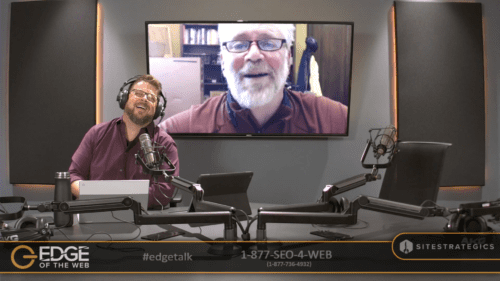The special guest we featured in episode 325 of the award-winning EDGE of the Web podcast was Mike Blumenthal, co-founder of GatherUp and LocalU. Host Erin Sparks spoke with Mike about local search and business reputation. Here’s what we learned:
Mike Blumenthal: His Background and Experience
Mike Blumenthal is a co-founder of both GatherUp and LocalU, and is basically the godfather of local search. GatherUp is a computer software application that helps businesses provide better customer experience through customer reviews and feedback. Mike also co-founded LocalU, where he works on weekly podcasts and newsletters to help plan conferences and moderate the forums. Mike is actively publishing content on his own personal blog, industry websites, conferences, and on social media. Mike’s nickname is Professor Maps. Why? Someone once told him early on when he started making presentations that he seemed too much like a professor. Although it was probably a criticism, Mike decided to just embrace it.
Back in the 1980s, Mike has a computer store, and then when the internet came along he built a content management system to allow local area businesses to better manage their web presence. He could see early on that everyone would need to do well on Google, even though local search was non-existent at that point in the early 2000s. When Google Local finally launched in 2005, Mike was very excited because he knew he could finally throw out the nine different Yellow Pages books he had to rely on for prospecting. No one else was writing about local search even though he thought it was the coolest thing ever. He launched his blog about local search in September 2006, 13 years ago. But his core business was still selling websites and web hosting. It wasn’t until he co-founded LocalU in 2011 that he become a local search consultant.
Is Local SEO a Misnomer?
In one sense saying “local SEO” is a bit of a misnomer because it’s more about local marketing than strictly “search engine optimization.” When it comes to local search, what Google is really aiming for is a “zero-click” search experience. What does that mean? It means you get the answer to your question right in the search engine results page and don’t have to click through to another website to get the answer you’re looking for. In local search, it means getting as much as you need to know about a local business without having to visit that company’s website. The impact is significant. Up to 70-80% of incoming leads might now come from the front page of Google search results as opposed to through the website of the business or from elsewhere.
The Ever-Changing Landscape of Local Search
Google is constantly evolving local search with features to boost engagement, such as the changes to map icons to be more engaging. And of course it’s all highly geared to mobile users.
Google’s stated goal at the last conference was to solve problems for users, beyond just answering their questions. What’s developing is a whole range of transactional capabilities, such as getting a quote, reserving a table, making an appointment, booking a hotel. These are all transactional things that are occurring directly on the front page of Google without users needing to go to the websites of the businesses.
There has been a negative reaction among some in the business community to these developments. After all, these companies have spent years developing great websites to serve their customers and then Google just comes along and bypasses all of that hard work. Mike’s perspective on this refreshingly simple: A lead is a lead, right? It doesn’t really matter where it comes from. If it comes from the front page of Google search results, then so be it. The important thing is getting the leads!
Reviews and Local Search
A couple years ago Mike ran a fascinating experiment to see how Yelp reviews could affect local search reviews for a bar. It demonstrated how Google goes out to get information about a business. The bar used in the experiment was one that basically had no significant web presence at all. Mike asked six or seven friends to write reviews of the bar on Yelp targeting a particular phrase. Yelp then anointed that business as a top 10 business in dive bars. The Yelp page surfaced in the organic results fairly quickly and that drove, within a few days, a local pack from Google. It was a simple but powerful demonstration of how review of a business can drive Google’s local search results.
Perhaps even more interesting is that because there were no previous reviews of the bar, lots of people just don’t want to be the first. After seeding with those initial reviews, then everyone else started writing reviews of the bar and it soon was vaulted into “one of the best bars” in that location! Yes, reviews are important.
Starting in 2016 there was this development called Reviews from the Web, where Google shows in the business profile up to three pages of review sites about your business. What happened with this is that when you searched a brand or business, any sites with reviews of that business or brand were elevated in the search results. It was a way for Google to quickly show users a snapshot of the company’s reputation represented by reviews. More important than how this affects ranking is how it affects conversions. When users get this snapshot of a brand’s consistent well-rated presence across multiple sources, conversions can increase dramatically.
Google looks everywhere for reviews. When you’re looking at it from a tactical point of view as a long-haul thing, it’s not a one-and-done enterprise. Reputation is one of these ongoing things you have to deal with forever. You need to think about the fact that Google is willing to show up to three review sites there, plus more in their organic results. You, over time, should be working on all of them, including your own site, in order to maximize conversions. But also know that Google is gaining entity information from these first and third party reviews, reviews at Google and other sites. Whatever shows up on the local Google search page for your business is what you need to be consciously managing – and it’s a wide-ranging set of sources that can show up there. It all comes together in what Mike thinks of as a Google brand story, and it’s important because people are using that Google page at some point to make their purchasing decision.
Is Google Valuing Customers Over Businesses?
Google pulls in all kinds of information from various sources to present about a business in local search. Not all of it is going to present a favorable view of the business. This is simply the reality these days. Since reviews have come out in local search, the power has in fact shifted somewhat. Consumers now have an active voice in defining your brand. You can either choose to let them define it, or you can choose to participate in that conversation and define it with them. Those are the choices. Ignoring it is no longer a choice, getting angry about isn’t very productive.
The only path forward in this is accepting, and acceptance means engaging with this productively. That includes improving your business, because sooner or later, it’s not just about getting more reviews, it’s about getting reviews you’ve earned because you’re running a good business, which is the end logic here. In this sense, reviews aren’t a tactic, they’re strategy. They’re an insight into how your business is doing as perceived by people beyond your business. That’s incredibly valuable information.
Many businesses are freaked out by this perceived loss of control. But it isn’t that bad. The reality is that you can engage with your customers more effectively and thoroughly. You can be the first line to ask them what they think you can improve. These are all process-driven things you can do to drive your presence on Google and be sure your brand story is a consistent one across all the places Google is looking.
Connect with Mike Blumenthal, GatherUp, and LocalU
Twitter: @mblumenthal (https://twitter.com/mblumenthal)
LinkedIn: https://www.linkedin.com/in/mblumenthal
Facebook: https://www.facebook.com/professor.maps
GatherUp website: https://gatherup.com
GatherUp Twitter: @GatherUp (https://twitter.com/gatherup)
GatherUp Facebook: @goGatherUp (https://www.facebook.com/goGatherUp)
LocalU website: https://localu.org
LocalU Twitter: @localuniv (https://twitter.com/localuniv)
LocalU podcasts: https://localu.org/subscribe-to-our-podcasts
LocalU newsletter: Subscribe via LocalU website


